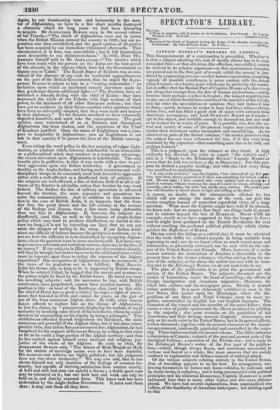CAPTAIN MARRYAT'S REMARKS ON AMERICA.
THE disappointment of a continuation is proverbial. Whether it is that a subject adiniting this sort of double climax has in it some concealed flaw—or that attention, like affection, once chilled, cannot he revived in its pristine eagerness—or that spontaneous thoughts are poured out in the first part of a work, whilst the second is pro- duced by a squeezing process—or that human expectation, imagining vaguely all possible excellences, is never content with the actual when it comes—is a knotty point which may be settled by the reader. Let it suffice that the Second Part of Captain Maitayar's America is not altogether exempt from the fate of human productions,—partly because there perhaps is it flaw in its plan ; the subject requiring two books, one of which should have contained the narrative of his travel; and the other the speculations or opinions they had induced him to form,—partly because he seems to have had three volumes always before him, and has filled a good deal of space with extracts from American newspapers, and Lord DURTIAM's Report on Canada— apt to his object, and readable enough in themselves, but not stuff to be looked for in works of price. It is possible, too, that the ex- tent and variety of some of his present topics may contribute to render their treatment rather incomplete and unsatisfying. As we observed on parts of the former volumes, " the reader perceives that the subject has not been exhausted for him, if it has even been mastered by the expositor—that something more has to be told, and perhaps learned."
This is a judgment upon the volumes as they stand. A high authority has directed the critic to regard " the writer's end ;" and, in a "Reply to the Edinburgh Review," Captain MARRYAT avows that his end was to have a shy at Democracy. For this pur- pose he desired a popular reading; and with this view every thing was sacrificed to readableness.
" A very acute reviewer," says the Captain, "ha, observed of my first pot,. tion, that there always appeared as if there was something left behind cnci T n2! told. He was right : I have entered into every subject just as deeply Al I dared to venture, without wearying the eland readers for whom, altbougs not avowedly, yet in reality, the work has chiefly been written. The second por- tion will therefore be found almost as light and trifling as the first."
A reason, no doubt, for the characteristic alluded to, but which will not change the nature of the work, nor give the reader complete instead of somewhat superficial views of a large question. What more the Captain might have told if' he pleased, we know not ; but we suspect that there are things both in nature and in nations beyond the ken of MARRYAT. Dover Cliff,- for example, would never have suggested to him the images in Lear; and he might have pondered on the French Revolution for ever without reaching the profound political philosophy which distin- guishes the Reflections of BURKE. Having noted this failing as a critical fact, it must be admitted that the work fulfils its author's purpose in being readable from beginning to end ; nor do we know where so much sound sense and information, so pleasantly conveyed, can be met with on the sub- ject of the United States and Canada. More, however, of a mains animus towards the institutions of America is discernible in the present than in the former volumes ; whether arising from the na- ture of the subjects, or the abuse the author has met with in Ame- rica and in the Eduaburgh Renew, we do not undertake to say.
. The plan of the publication is to paint the government and society of the United States. The subjects discussed are the modes of locomotion, under the head of travelling; the effects of foreign immigration and American migration ; literature, dis vided into authors and the newspaper press. Society is treated rather partially. It is most elaborately exhibited as seen in the new States that border upon the Mississippi, where the dis- positions of our Slave and Penal Colonies seem to meet to- gether, uncontrolled by English law and English bayonets. The character of the women and the morality of the sexes follow ; then comes a view of public opinion and the effects produced by yielding to the majority ; also some remarks on the patriotism of the Americans, and their feelings towards England. Aristocracy, not only as its seeds exist in the United States, but in its general effects, is then discussed; together with the present character of the Ameri- can government, confessedly appointed and controlled by the majo- rity. These topics conclude the second volume. The third embraces a discussion on Canada ; a sketch of the past and present state of the aboriginal Indians ; a narrative of the Florida war ; and a reply to the Edinburgh Review's notice of the first part of the publica- tion,—which, though always fluent, and sometimes successful, is verbose and forced as a whole, like most answers that are mainly confined to explanation and defence instead of satirical attack. Of the various subjects relating entirely to the United States, that of travelling appears to us the best. Its arrangement, em- bracing locomotion by horses and horse-vehicles, by railroads and by steam-boats, is complete; and it being unconnected with political
principles and his abhorred Democracy, Captain MARRYAT is more unbiassed here than in many other topics, and also more philoso- phical. We have had several explanations, from unprejudiced tra- vellers, of the familiarity of American innkeepers ; but nothing equal to this


























 Previous page
Previous page